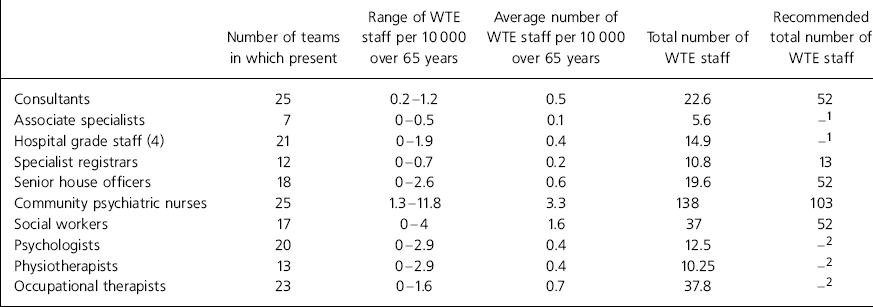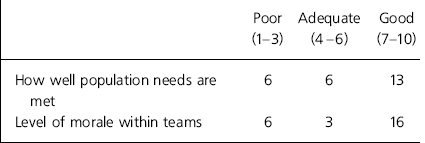The population of Britain is ageing. By 2010 estimates predict that more than 2.3 million people will be over the age of 80 (Government Statistical Service, 1993). This has major implications for service needs for the elderly with mental health problems. Not only will the numbers of elderly people developing dementia or functional illness increase significantly, but those who have developed enduring mental illness when young will age also.
With the advent of devolution the examination of psychiatric services for the elderly in Wales as a discrete entity appears particularly relevant.
The increasing emphasis on clinical governance and on provision of services based on population need rather than historical precedent has led to more formal approaches to service planning being adopted.
Previous studies concerning service provision in old age psychiatry (Reference Benbow and JolleyBenbow & Jolley 1992; Wattis 1998a,b) and the recent Audit Commission report, Forget Me Not — Mental Health Services for Older People (Audit Commission, 2000) found marked geographical differences between the services examined. The Audit Commission found that spending on services for the elderly with mental illness varied between £300 000 and £2.5 million per 10 000 elderly population.
The Royal Colleges of Physicians and Psychiatrists have produced guidelines for indicative service levels in the report The Care of Old People with Mental Illness: Specialist Services and Medical Training (Royal College of Psychiatrists & Royal College of Physicians, 1998).
Defining services currently in place is an important step in planning coherently for change. Therefore, this study was designed to gather information regarding existing old age psychiatry services and to establish whether the Colleges' recommendations had been met.
The study
A total of 25 consultants were identified from information supplied by the Royal College of Psychiatrists and by telephoning each individual trust. Two posts were identified as vacant.
Consultants provided the most obvious point of contact, as most services are consultant-led. A copy of the questionnaire was sent by post to each consultant in May 1999. Those who did not respond initially were sent a further copy 6 weeks later.
The questionnaire covered the following areas:
-
• size of population served
-
• staffing
-
• provision of NHS acute, respite and long-term beds and day hospital places
-
• subjective opinions concerning morale and how population needs were being met
-
• opportunities for general comments by respondents.
The aims of the study were to examine the existing provision of old age psychiatry services in Wales and compare this with the indicative service levels published by the Royal College of Psychiatrists and Royal College of Physicians (1998), and to gather consultants' subjective opinions of their services and look for any association with the size of the population served.
Findings
All consultants responded to the questionnaire. Three of the 25 consultants surveyed were not specialist old age psychiatrists: one was a general adult psychiatrist also covering the old population within his catchment area; one looked after all psychiatric patients, including children; and one looked after general adult psychiatric patients in his area and patients with dementia trustwide, describing himself as having a special interest in old age psychiatry.
The way in which services for those with functional illness were provided varied:
-
• no service provided care for all of those with functional illness over 65 years
-
• nine teams normally only provided care for new referrals
-
• eight teams provided care for new referrals and those patients over a certain age previously cared for by general adult services (the specified age ranged from 65-80)
-
• the remaining eight teams had varying criteria: two shared the workload with general adult teams; three were the non-specialist teams described above; and three said that factors other than age, for example physical condition, were more important.
Every team provided care for all dementia sufferers irrespective of age. Sixteen of the 25 consultants stated that they were aware of a written policy for service provision and planning for older people with mental illness within the trust. The Colleges' recommendations that each profession should be represented in every team were met in only nine of the 25 teams.
Comparisons between actual and recommended numbers of staff and facilities are shown in Tables 1 and 2.
Table 1. Staff numbers for old age psychiatry in Wales

| Number of teams in which present | Range of WTE staff per 10 000 over 65 years | Average number of WTE staff per 10 000 over 65 years | Total number of WTE staff | Recommended total number of WTE staff | |
|---|---|---|---|---|---|
| Consultants | 25 | 0.2-1.2 | 0.5 | 22.6 | 52 |
| Associate specialists | 7 | 0-0.5 | 0.1 | 5.6 | -1 |
| Hospital grade staff (4) | 21 | 0-1.9 | 0.4 | 14.9 | -1 |
| Specialist registrars | 12 | 0-0.7 | 0.2 | 10.8 | 13 |
| Senior house officers | 18 | 0-2.6 | 0.6 | 19.6 | 52 |
| Community psychiatric nurses | 25 | 1.3-11.8 | 3.3 | 138 | 103 |
| Social workers | 17 | 0-4 | 1.6 | 37 | 52 |
| Psychologists | 20 | 0-2.9 | 0.4 | 12.5 | -2 |
| Physiotherapists | 13 | 0-2.9 | 0.4 | 10.25 | -2 |
| Occupational therapists | 23 | 0-1.6 | 0.7 | 37.8 | -2 |
Table 2. Places available for old age psychiatry in Wales

| Total number of places in Wales | Royal College recommended range for stated population | Average number (per 10 000 over 65 years) | Variation in place numbers between services (per 10 000 over 65 years) | |
|---|---|---|---|---|
| Acute assessment beds | 477 | 513-1027 | 10 | 4-24 |
| Day places | 641 | 962-1437 | 15 | 5-29 |
| Respite places | 173 | -1 | 8 | 0-25 |
| Continuing care places | 654 | -1 | 15 | 0-59 |
| Respite and continuing care places | 827 | 718-1436 | 19 | 0-59 |
Respondents' opinions of their services
Respondents were asked to rate their services subjectively on a simple numerical ordinal scale. The results are shown in Table 3.
Table 3. Respondents' opinions of services (n=25)

| Poor (1-3) | Adequate (4-6) | Good (7-10) | |
|---|---|---|---|
| How well population needs are met | 6 | 6 | 13 |
| Level of morale within teams | 6 | 3 | 16 |
Respondents' responses concerning morale and how well they felt their service was meeting the needs of the population they served were also examined using χ2 test to look for any correlation with the size of the population of those over the age of 65 years served by each consultant. No association was apparent between these variables (P>0.3).
Discussion
The findings of this survey suggest that in comparison with the Royal Colleges' guidelines, old age psychiatry services in Wales are significantly underresourced both in terms of staff and the availability of places.
Exceptions to this finding were the number of community psychiatric nurses, which exceeded recommendations, and the presence of non-training grade doctors. Associate specialists, staff grade doctors and clinical assistants are not mentioned in the recommendations, yet these numbered 20 whole-time equivalent posts. It may be that the balance of staffing has shifted and that the deficits in medical staffing were less than initially seemed apparent.
Possibly as a reflection of poor resourcing, 25% of respondents regarded their services as only poorly meeting population needs and 20% admitted to low morale within their teams. When considering these findings it must be borne in mind that these were the subjective opinions of the consultants, which may not be consistent with those of other members of the multi-disciplinary team or of other agencies.
It was interesting to note that no correlation was found between the size of the population served and these variables. It is possible that small sample size led to an association having been missed. Factors other than population size may have affected the assessments. Eligibility criteria for care ranged widely. Differences in levels of service provision may be a cause or an effect of this finding.
The Royal Colleges' indicative service levels are based on expert consensus and not on formal evidence-based needs assessment. It is possible that in fact the levels of provision suggested in the recommendations are unnecessarily high and that the existing levels within Wales are adequate. However, this suggestion is belied by comments made by respondents, the majority of whom stated that resourcing and staffing levels would be the first things they would like to improve within their services given the opportunity.
The Royal Colleges' guidelines look in the main at the medical aspects of provision of services for older people with mental illness. In fact these provide only one aspect of the services required. Also of importance are all the other agencies involved in the provision of care. However, it was considered beyond the scope of this study to incorporate these agencies.
In the light of the current emphasis on clinical governance and needs-led services, it was concerning to find that only 16 of the 25 consultants surveyed were aware of any written policy for service provision and planning within their trusts.
Marked variations in all elements of provision between services exist as have been found in the studies mentioned previously. Reasons for this are unclear. These variations are not consistent — services that are well-provided in one area are underprovided in others.
In conclusion, old age psychiatry services in Wales are significantly underresourced compared with the service levels suggested by the Royal College of Psychiatrists and the Royal College of Physicians (1998), although the presence of non-training grade doctors may compensate in part. The variation and inconsistency of provision between services found in this study highlights the need for future planning and provision of services based on need rather than the inconsistent situation that currently exists.
Acknowledgements
I wish to thank the consultants in old age psychiatry in Wales who all took the time to respond to this survey.






eLetters
No eLetters have been published for this article.